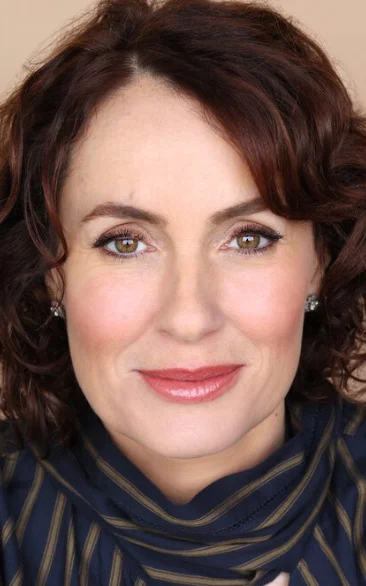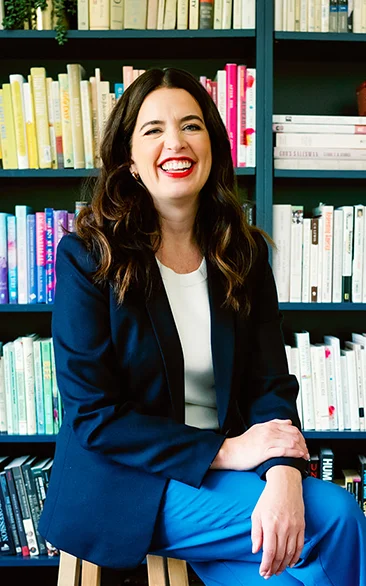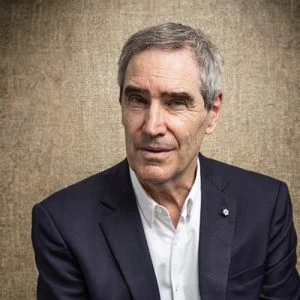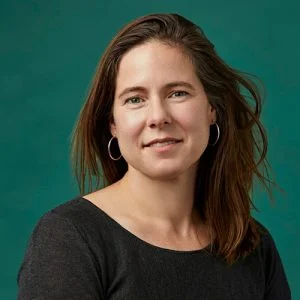Kate Bowler: I’m Kate Bowler, and this is Everything Happens. I have a prayer that I started praying when I got sick and it went like this: God, help me see the world as it is. I’ve been studying the prosperity gospel and after so many years of watching people believe that the right kind of faith, the right kind of performative joy and the right kind of certainty would give them health and wealth and everything that makes a life a life. And it taught me a lot about hope and reaching for more and looking for the best in everything. But it didn’t teach me a lot about coping with reality. It was as if I’d studied and lived in a world of all bright yellows and oranges and greens and now I would need to find a way to see clearly the world that was all deep blues and purples and fading to grays. We live in a social media universe, carefully curated to be all the bright colors. Choose joy. Find the silver lining. Count your blessings. Sunshine, sunshine, sunshine. If you can’t find your way to the sunnier side of life, then there must be something wrong with you. Stop being so negative. Don’t say that and make it true. And my favorite, look on the bright side. My prayer is so simple. Let me see things clearly, but it is so hard to do it when all the acceptable emotions are crowded into one corner. So what better person to talk to you about rediscovering a range of human emotion with me than my guest today. I am about to meet my intellectual soulmate, and I am very excited. Meet Dr Susan David. Dr David is an award winning Harvard Medical School psychologist. Her bestselling book, Emotional Agility, describes the psychological skills critical to thriving in times of complexity and change. So you know exactly what we need right now. And you must watch her TED talk on the subject that has been seen more than eight million times, and we are academic twins because we both care more about the dangers of forced optimism than anyone I have ever met. Susan, what a joy. Thank you so much for doing this with me.
Susan David: I’m so delighted to be with you. And that introduction was beautiful. I literally had chills as I listened, because I think that is so much of what is at the core of my work, which is how can we see ourselves clearly and how can we believe in others clearly?
Kate: Yes, that’s right. We see this topic, you know, maybe from two similar but slightly different disciplines, mine from a kind of spiritual and religious angle where I watched that kind of performative optimism as a tool that believers use to create a very different future for themselves and prove God’s blessing for their lives. But yours comes from a psychological angle, and we both are, we both really meet at the beginning here, which is that toxic positivity is sort of fundamentally unhelpful.
Susan: That’s correct. Really, when we force our difficult emotions aside and these are difficult emotions that are born of the reality of life, of the reality that you know, that there is fragility, that fragility is interwoven between love and grief. Fragility is interwoven between the idea that we raise a child and then we say goodbye to that child in some form. There is fragility that is just so interwoven in life. And really, my work is borne of the idea that when we push aside the difficult emotions that come with the fragility of life then what we also do is we push aside our capacity to deal with the reality.
Kate: Mh-hmm. When you say that, I can just think of so many examples where people thought that joy or optimism or the brighter emotions were going to help them. But I mean, I’m thinking of people I knew in in sort of positive thinking circles who really thought that that strategy would help them through the illness of someone else or themselves or help them through caregiving. I mean often and even as a patient, when I go to the hospital, I’d see it in little sticky notes around people’s monitors like, you know, there’s tomorrow is going to be better. Like that the future was helping them deal with today. But then I mean, I’ve been to prosperity gospel funerals and people who just who can’t get over the feeling that that negative feelings and emotions are actually like a fundamental failure on their part.
Susan: It’s so, it’s so challenging. One of my most powerful memories, Kate is, and it’s a very, very difficult memory. But when I was a child, my father was diagnosed with terminal cancer. One of my most profound memories of my father was me going into his bedroom, this was months before he died, and he was lying in his bed, just sobbing, sobbing, sobbing. He had recently been visited by a group of people that belonged to the church that he belonged to. And he was crying, and the reason that he was crying was because the messaging that he had got from that visit was that he was going to die because he did not have enough faith. And for our family, this actually had devastating consequences. And that was that my father had all of his life had life insurance. And when he died, we found out just a couple of months before that he had actually canceled his life insurance. And the reason that he canceled his life insurance was because in his confused, tormented terminal state he had somehow gotten it into his mind that what these people were saying to him was that life insurance is a sign that you don’t have enough faith and that if you put away these crutches it’s a sign that you do have faith. And it was this devastating effect, which is that my mother was left raising three children because of my father’s idea that this feeling this, this being scared, this lack of so-called positivity was actually bringing about his demise. And so I think, you know, on the one hand, we see these things on social media that say things like just be positive and as you so beautifully describe it leads us to feel that we are not good enough or not enough, or that there’s something wrong with us. And yet my work is really this work that says this is normal. This is normal when we are going through these difficult experiences and we have these emotions that have evolved that are part of us as a humanity. That are beautiful, that are essential, that these emotions are not to be done away with, they are rather to be connected with because we want something really important.
Kate: Instead of being ashamed of our humanity, ashamed of our finitude, ashamed of our, you know, the ways that sometimes things break or there we lose, but are not losers. I mean, the amount of sort of normative language that that just gets heaped on suffering is is I think it’s a cultural phenomenon in the United States.
Susan: This idea is actually it becomes a tyranny of positivity, and that sounds a little bit facetious. Like, how can positivity be a tyranny? Yeah, and yet when we think about it, when we think about experiences that people have when they feel marginalized or when they are suffering or when they are dying, they are told to just be positive. It is the most profound way that we could not see another person. Yeah. And so it is a tyranny and it’s cruel and it’s unkind and it’s ineffective. And we do it ourselves and we do it to other people.
Kate: I’m a little shocked sometimes by how much we have in common, to be honest.
Kate: I wrote a history of Christian influencers recently because I was just sort of thinking through one of the sort of consequences of this prosperity slash positive thinking culture, and one things I noticed even just in the last couple of years is the way that people have started borrowing psychological language that they may not have a precise medical definition for like anxiety. And then you get all this whole slew of Bible teachers writing anti-anxiety books as if the way to manage negative emotions in your life is to not just manage but conquer them. Because we all know that that books that would say something like, Oh hey, this is reality we can do a bit better is not going to sell nearly as well as, like, achieve total emotional self-mastery by so-and-so.
Susan: Yes. The way that I started to experience this when I was doing my Ph.D. in this area is that even in a psychology department, it was extraordinarily difficult finding a supervisor, an advisor, who would advise me on a topic looking at emotions. Because emotions were seen as these intangible difficult to measure intractable things. And so it was really difficult. And so one of the things that I’ve really focused upon in my work is this idea that our emotions, all of them, even the more difficult emotions have evolved to help us to adapt to the reality of life. And so what I do with in that perspective, I’m basically saying that there is no good or bad, positive or negative. But as soon as we start saying this is a bad emotion, then what we doing is we sidelining it when instead we start to say, this is how I’m feeling when we show up to difficult emotions and we move away from the hustle and instead we move into the space of willingness and acceptance. Yeah, that is something very powerful that happens. And when I say willingness and acceptance, I don’t mean passive resignation, you know, I don’t mean, Oh my god, this is this is how I feel there’s nothing I can do about it. This is terrible. I mean, more this is how I feel and human is tough right now.
Kate: I hear you say it like when I I remember reading that chapter in your book and thinking, like, OK, she’s asking for curiosity. I love when you say thinking about emotions as data like, OK, I’m receiving information as opposed to, I want to have a panic response to this bad feeling. I want to rush through it as quickly as I can. Or I mean, I think of all the common responses people have to to, you know, even just like someone getting hurt when you like, walk it off your OK, don’t cry like all the skipping to the end strategies.
Susan: So often what we do when we have these difficult emotions as we might either bottle them, which is pushing them aside, recognizing them, doing the force positivity or what we might do is we brutal them. We get stuck in them, we feel them so deeply that we are unable to move beyond them. And when you bottle emotions, when you push them aside, it’s almost like those emotions are still there. But you’re carrying them so intensely and so astutely away from your body that you aren’t really living life. You’re so angry with something that’s happened, but you’re not having the conversation about it that actually you start to shut down from people who might mean something to you or can actually help you. So bottling is one way that we deal with this, and we know that bottling doesn’t work, that that we drop the bottle. You struggle, you push aside the difficult emotions. You decide you aren’t going to have that conversation. And then what do you do? You either have what we call emotional leakage with the emotions come out over the Thanksgiving dinner table or we experience lower levels of well-being or we erode our own sense of self-worth because we are gaslighting ourselves. So that’s what happens when we bottle emotions. When we brewed emotions, we’re getting stuck in them. We’re treating our emotions as fact. We’re saying, I feel this, this is the only reality. And when we do that, we’re holding the book so close to ourselves that we aren’t able to look into the eyes of our child, we aren’t able to feel their hand, we aren’t able to be in the world. And we also aren’t able to connect with parts of ourselves, Kate, that are also undeniable, which is our wisdom and our our values and our beauty. And and so really the idea here is, you alluded to this earlier, what I talk about is our emotions are data not directives. If we can show up to them with curiosity and with compassion. Yeah. We can start saying, what are they pointing to about what I care about? What are they pointing to about my values? So now we aren’t being driven by the emotion, rather we stepping into a place of wisdom.
Kate: Yeah, yeah. Reading your work, it reminded me of something I just started doing only really since I got sick was I felt the disconfirmation of the way I felt like I was supposed to be in the world like I felt like I was supposed to be a very cheerful and grateful cancer patient. I mean that you would imagine that I was starring in a reality show of a person who gets cancer and is just, like, very pleased with the results. And I, and a part of that was gender, part of it was religious prescriptions that I had absorbed a version of Christianity that was always just positive that that, you know, that that God was going to make up the difference, you know, no matter what. And then and then I’ll just a, you know, a family culture in which I thought, I really should keep it together. And one of the only things that started working is my friends, like the people who are really close to the to the pain of it used to say stuff like, You’re sad because it’s upsetting. You’re angry because it’s maddening. Like, they would just reflect back to me and I could feel myself just like, start to settle. I think it was like that description you have about, like dropping the rope, like no longer feeling, I guess, guilty or overwhelmed by just how bad it was. And then it didn’t feel like it had quite the same pull anymore.
Susan: Yeah, it’s so language, language is so powerful. And what you describe about that experience makes me think about something that I’ll offer in case it’s helpful to people who are listening, which is that often when we experience difficult emotions, we’ll say something like: I am sad, I am angry, but I’m not allowed to be or I am sad, I am angry, but whatever. One thing that can be really helpful is to create psychological space between us and the emotion. So this allows the emotion to become part of ourselves. But again, as data, not directives. To the way that this looks is, I’m noticing that I’m feeling sad. So we’re moving from I am sad into I’m feeling sad or I’m noticing that I’m feeling sad or even this is sadness, which is what we’re describing in that experience. Yeah. So what are you starting to do here is you’re not pushing aside the difficult emotion, but rather what you are doing is you are creating linguistic space. So the other parts of you are able to come forward and there’s breathing room. Yeah. And a little bit of the, you know, to extend it a little bit the metaphor that I sometimes use is is this idea that if you walk outside and you see a cloud in the sky. It’s almost when we say I am sad that it’s like you are the cloud, you know, you are that sad cloud. You say, I’m noticing that I’m feeling sad, I’m noticing that this is my I’m being undermined story. So you’re noticing your thoughts, your emotions, your stories for what they are, they thoughts, their emotions, their stories, not fact. What you start doing is you move beyond the I am the cloud into you are not the cloud, you are not that emotion. You are the sky. You as a human being, are capacious and beautiful and extraordinary enough to experience a full range of emotions, even the more difficult ones and not be defined by any one of them.
Kate: Yeah, that’s right. Identifying language that’s so interesting. I can think of all kinds of examples where words like where, where either feelings or roles became totalizing, like, I’m a cancer patient or something. I was like, Oh, I was a professor two seconds ago. I can see how that like over identify doesn’t let there be enough breathing room between the range of experiences and and these of these events and dynamics and all the things that life keeps throwing at us.
Susan: And the reality is, is that our roles are going to change in our lives because we get older and because we need to change. Yeah. Having this fluidity becomes really important.
Kate: How dare you? I’m going to glom on. I’m going to glom onto the only things that work and then I’m going to smothers them myself with it. And I know, I mean, I think you’re right. I mean, all the all the labels I can think that we we use when we introduce ourselves or when we because we can over identify with our achievements and with our pain or with I mean, I hear it all the time from people were like, well, especially if they’re tired, or then all of a sudden they’re like, I’m a caregiver, like, I’m the – then they’re all of a sudden a whole series of actions that are that are absolutely true of their day to day, but have become kind of eclipsing of the rest of who they were.
Susan: They they become definitive. And then when you label your emotional experience with a very big umbrella term, so we’ll say something like, I am stressed, your body, your psychology doesn’t know how to deal with that. It’s stress it feels like there’s no boundaries. It feels like it’s so dark, it feels so murky. And yet there’s a world of difference between stress versus disappointed, stress versus unsupported, stress versus that knowing- knowing, feeling of I’m in the wrong job or the wrong career. We know that even in children as young as two and three years old, when they are more able to accurately label their emotions, it actually accounts for high levels of well-being, better capacity to regulate, better ability to achieve your goals. And this person is able to accurately connect with a label that disquiet is going to be the individual who can self-regulate better and who can pull back from peer pressure. And so we know that this accurate labeling of emotions is a core, foundational psychological skill that enables well-being that enables effectiveness. We number one need to recognize that we can say I’m noticing the feeling so that we create space. Another core skill of emotional agility is being able to label emotions in a more granular way. Yeah, so I am stressed versus I am disappointed. What is that doing with indicating that you might need to have a difficult conversation? I am stressed versus I feel unsupported means that the action that you are taking that is connected with your values at the moment is how do I get more support towards me or how do I access support that’s been offered? Very difficult. I was sitting in a space of, Oh my goodness, I’m stressed.
Kate: I sometimes use, I often use, very exaggerated language, one because it’s more fun, but two the tragicomedy of life creates a surrealism and sometimes the the more extreme language helps me manage, frankly, like, Oh, it is, it is as ridiculous as it seems to be, and then I kind of relax into it. But lately I’ve been finding, I think in the pandemic in particular, when sometimes there’s a monotony of the same problem that sometimes the exaggerated language has really made, I mean, I just can’t afford that language right now. And so one of my best friends and I we decided because we talk every day and I just love her so much and but we both have very similar myths about our lives, we’re so hard working, you know the world will fall apart if we don’t do certain things. And lately we’ve been saying, you know what, we have to be more precise in our language. We have to be really picky about the words we use to describe ourselves. So instead of saying, you know, and then it was, you know, it was it was like a like a stressful day or something, say something more like I was embarrassed because there was too much work and I couldn’t meet all these expectations. Or I weirdly feel shame that I disappointed somebody and I’m positive now that I’m saying it, that shame is not the appropriate emotion I should be having, but sometimes being less – dramatic helps me get somewhere emotionally like, Oh, it helps me validate a feeling, but then after that, it kind of loses its usefulness.
Susan: We know that often when we are working with clients, we’ll say to the person, What do you think you should do about the situation? And the person says, I’ve got no idea. That’s why I’ve come to you to ask for help. You’re job is to tell me, not my job. Then you say to the person, I would love us in this moment to bring in someone who loves you, who is wise, who wants the best for you. Let’s bring this imaginary person into the room, and I want you to imagine what that person’s advice would be about the situation that you feel stuck in. And it’s extraordinary because this individual now starts saying, Well, you know, my wise Uncle Jack would advise me to do. And they come up with a range of solutions. Now wise Uncle Jack is not in the room. What has happened? What has happened is the person is engaging with a third person or a different perspective about the situation. And so this is again a psychological tool where all of a sudden they say, Well, Jack says I should do A, or Jack says I should do B, and Jack… And the decision comes to them.
Kate: I find it sometimes hard to talk, I don’t want to sound arrogant, like, Oh, I live in the deep end. My life is so deep and rich. Welcome to reality. Join me here. It’s not that I feel that way sometimes, but so often just because of the nature of of of life and sometimes being unlucky a few times in a row. It means that sometimes I do need people to have a kind of wider sense of sometimes life is, sometimes life comes apart, and sometimes not everything is possible, and talking people into living here with people like us does feel tricky. Sometimes sometimes it feels honestly like a bit of like a betrayal, sometimes when just really lucky people don’t don’t know what it’s like for for the rest of us.
Susan: If I think about the through line of my work, separate from the academics, you know, separate from the evidence in the research, like separate from all of that, it’s like the through line I think of my work is really if I choose one word, it’s about seeing. It’s about what it’s about seeing the self and it’s about seeing others. And I really believe that it becomes only possible to see others and see other people’s pain if you are willing to see yourself and see your pain, that sometimes is in the big moments of life. But so often it’s it’s in the micro moments because it’s in the micro moments of being in a one bedroom apartment in a pandemic and feeling it tough. It’s in the micro moment of saying to yourself, this is tough. Rather than saying this is tough, but I’ve still got an apartment, you know, there’s the micro moment that walks us into the space of being compassionate with ourselves? Yeah. And it’s so powerful. And this is this is this idea, you know, this this idea of showing up to the self where I describe how it’s so important to do away with this, this rope, you know, doing away, dropping the rope, showing up to the difficult emotion, then creating the space, really getting the sense of distance and and very much, I think. This tension between we are all agentic in our lives versus we are- we have no control. When we say we are, we are completely the agents of our lives. Number one, it’s not true.
Kate: I loved the look on your face there. It was so gracious. It was like, how do I describe delusions.
Susan: How do I describe it’s not true. Number two, it actually sets us up for devastation because the the greater our attempts to control the uncontrollable, the more our suffering will be when we face difficult experiences. And number three, I think that a lot of the language around we are all encompassing agents of our lives. What it does is it ever gets the recognition that things like social policies can and do impact people’s wellbeing, their circumstance and so on. And I remember many years ago I edited a handbook called the Oxford Handbook of Happiness. For anyone who thinks that I’m anti-happiness, I edited a ninety chapter handbook on happiness. But the most remarkable chapters in that handbook was a chapter that really spoke about how where you live impacts in real ways on your wellbeing based on your level of commutes. It was such a kind of subtle but really important demonstration of how social policies even around public transport and about being able to have a means of earning and living in a way that is close to where you live and raising your family is going to impact on how many hours you spend with your children on the well-being of your families and so on. And so I think it’s really interesting because this idea of being fully agentic, I know that’s not a word.
Kate: It’s the right word, it is.
Susan: Being agentic is actually deeply harmful to us individually as well as to our communities. And but on the other side, when we say we are simply victims of the system, we are simply victims of circumstance is actually one of the most disempowering embodiments that we can have. We basically saying we give ourselves over to a system. I know Victor Frankl did not write these exact words, but he speaks to this idea, this idea between stimulus and response, there is a space and in that space is our power to choose. And in their choice is our growth and our freedom. So what am I doing in my work? I’m saying when we show up to our difficult emotions, and when we step out of them using the kind of strategies I’ve described earlier, what we’re doing is we are creating space between stimulus and response. And then when we sing our emotions signpost and this is probably one of the most important aspects of my work, our emotions signpost, the things that we care about. If you’re feeling bored, that boredom is a difficult emotion, but it might be signposting that you need more growth. If you are feeling lonely as a caregiver, a caretaker, that loneliness might be signposting that you value more intimacy and connection, and that this is a value that you need to move towards. If we think about the arc of showing up to a difficult emotion, stepping out of it, so it’s not defining us and then walking away saying what is the emotion signaling about what I care about or what I need in this moment? You then create the opportunity to have this tiny tweak this micro experience, this this agency that is small and yet powerful. And it’s powerful because moments make movements. Something small that I do today when I do it tomorrow and when I do it the next day, I know that like little frames in a movie, I then have a different movie relative to if I didn’t have that moment.
Kate: I love the way that your work describes both the individual and social worlds that make us and then ask us to make tiny little movements inside them without pretending that we are masters of our so-and-so and captains of our whatever. And neither are we just sort of tied to the train tracks like every cartoon damsel. Thank you so much for offering a wider, a more generous place for us to kind of slide up and down that scale of emotion. And your work has just been so personally meaningful to me. It feels it feels very justifying to feel like there’s a big, a big world that we’re allowed to live in. So thanks for making the world more beautiful for me. I really appreciate it. Thanks so much for being here.
Susan: Thank you. Thank you for inviting me, and I hope this has been of value to everyone listening.
Kate: I feel things big. And for the longest time, I felt so much shame because of it. I need reminders that my emotions are not bad or good. They’re just information. You feel angry because this is unjust. You feel sad because this is awful. You feel tired because this is exhausting. Your emotions are not wrong or bad or lying to you or the full truth. They’re giving you a bit of data that you shouldn’t ignore. We love and lose and fall and get back up and fail and try again. This is what it means to be human, to feel the pain, the grief, the stress, the risk, the fear, the heartbreak. So you, beautiful creature, you here is your permission slip to feel it all, to feel the joy and delight and excitement and the sorrow and fear and despair. All the yellows and pinks and violets and grays, because you are the whole damn sky.
Kate Bowler: Our work on the Everything Happens podcast and with the Everything Happens initiative is made possible because of our partners and generous donors Lilly Endowment, the Duke Endowment, Duke Divinity School and Faith and Leadership, an online learning resource and a huge thank you to my team who makes this work not only possible, but fun. Jessica Ritchie, Harriet Putman, Keith Weston, Gwen Heginbotham, Katie Mangum, AJ Walton, Kathrine Smith, Mary Jo Clancy, JJ Dickinson, and Jeb and Sammi. And if you’d like to be a human with me, come find me online at KateCBowler. I also have a weekly email that might be the right dose of love and courage you need. Sign up a KateBowler.com/newsletter. This is everything happens with me, Kate Bowler.















Leave a Reply